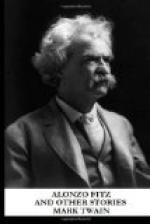I. These are fine oranges. Where are they grown?
He. More? Yes, I will bring them.
I. No, do not bring any more; I only want to know where they are from where they are raised.
He. Yes? (with imperturbable mien and rising inflection.)
I. Yes. Can you tell me what country they are from?
He. Yes? (blandly, with rising inflection.)
I. (disheartened). They are very nice.
He. Good night. (Bows, and retires, quite satisfied with himself.)
That young man could have become a good English scholar by taking the right sort of pains, but he was French, and wouldn’t do that. How different is the case with our people; they utilize every means that offers. There are some alleged French Protestants in Paris, and they built a nice little church on one of the great avenues that lead away from the Arch of Triumph, and proposed to listen to the correct thing, preached in the correct way, there, in their precious French tongue, and be happy. But their little game does not succeed. Our people are always there ahead of them Sundays, and take up all the room. When the minister gets up to preach, he finds his house full of devout foreigners, each ready and waiting, with his little book in his hand—a morocco-bound Testament, apparently. But only apparently; it is Mr. Bellows’s admirable and exhaustive little French-English dictionary, which in look and binding and size is just like a Testament and those people are there to study French. The building has been nicknamed “The Church of the Gratis French Lesson.”
These students probably acquire more language than general information, for I am told that a French sermon is like a French speech—it never names a historical event, but only the date of it; if you are not up in dates, you get left. A French speech is something like this:
Comrades, citizens, brothers, noble parts of the only sublime and perfect nation, let us not forget that the 21st January cast off our chains; that the 10th August relieved us of the shameful presence of foreign spies; that the 5th September was its own justification before heaven and humanity; that the 18th Brumaire contained the seeds of its own punishment; that the 14th July was the mighty voice of liberty proclaiming the resurrection, the new day, and inviting the oppressed peoples of the earth to look upon the divine face of France and live; and let us here record our everlasting curse against the man of the 2d December, and declare in thunder tones, the native tones of France, that but for him there had been no 17th March in history, no 12th October, no 19th January, no 22d April, no 16th November, no 30th September, no 2d July, no 14th February, no 29th June, no 15th August, no 31st May—that but for him, France the pure, the grand, the peerless, had had a serene and vacant almanac today!
I have heard of one French sermon which closed in this odd yet eloquent way:




